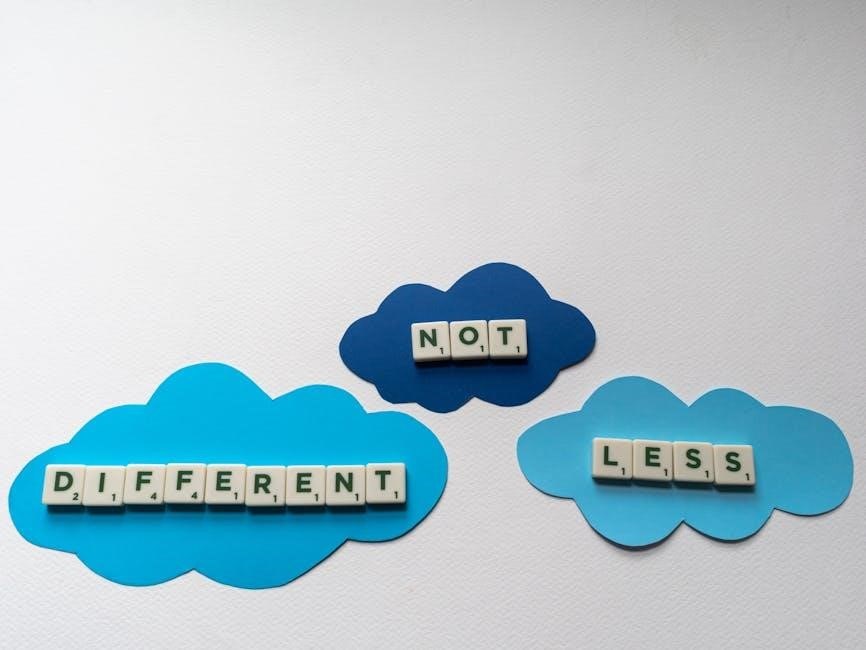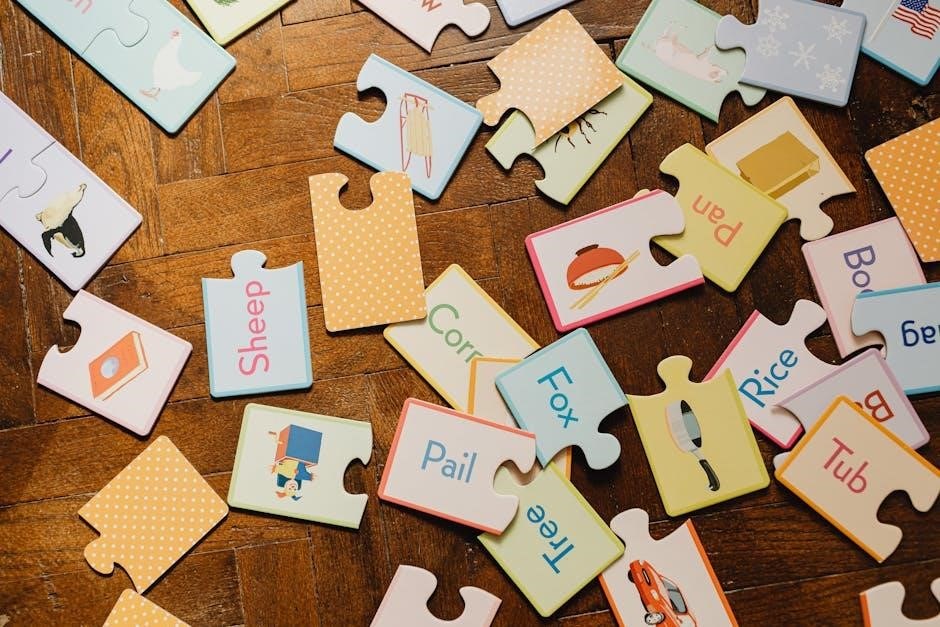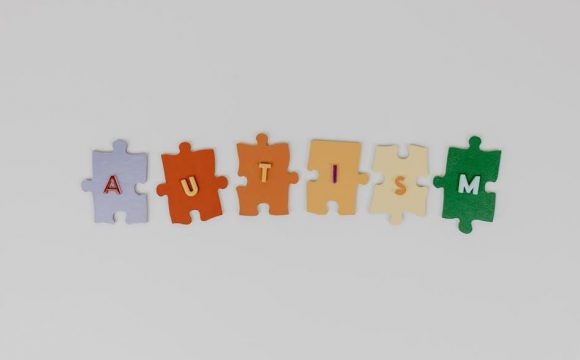Learning French for beginners starts with understanding the language’s basics and cultural context․ Essential elements include pronunciation‚ grammar‚ and common phrases‚ which build a strong foundation for further learning․
1․1․ The Importance of Learning French
Learning French opens doors to a rich cultural heritage and global opportunities․ As an official language in multiple countries and international organizations‚ French enhances career prospects and travel experiences․ It also improves cognitive skills‚ such as memory and multitasking․ French is a key to understanding renowned literature‚ cinema‚ and art․ Additionally‚ it bridges communication gaps in diverse professional fields like diplomacy‚ education‚ and business․ Acquiring French skills fosters personal growth and broadens cultural understanding‚ making it a valuable asset in today’s interconnected world․
1․2․ Setting Goals for French Language Learning
Setting clear goals is crucial for effective French learning․ Start with achievable objectives‚ such as mastering basic phrases or dedicating 15 minutes daily to study․ Break larger goals into smaller milestones‚ like completing a beginner’s course or holding a 5-minute conversation․ Celebrate progress to stay motivated․ Use tools like language apps or planners to track your journey․ Align your goals with personal interests‚ such as traveling or reading French texts․ Regularly assess and adjust your targets to ensure steady improvement and maintain a focused‚ enjoyable learning process․

Understanding the Basics of French Language
Mastering the French alphabet‚ pronunciation‚ and basic grammar rules is essential․ Learning common phrases and vocabulary builds a solid foundation for effective communication․
2․1․ French Alphabet and Pronunciation
The French alphabet consists of 26 letters‚ similar to English‚ but includes additional accents and diacritics like é‚ è‚ ê‚ and ô․ Pronunciation is key‚ as French sounds differ significantly from English․ For example‚ the “u” in French is pronounced with rounded lips‚ unlike in English․ Understanding accents like grave (è) and acute (é) is essential for correct pronunciation․ Beginners should focus on mastering basic sounds and intonation early‚ as this builds a strong foundation for fluency․ Practice through repetition and listening to native speakers can help improve accuracy․ PDF guides often include pronunciation charts and exercises to aid learners․
2․2․ Basic French Grammar Rules
Mastering basic French grammar is crucial for effective communication․ French nouns have gender (masculine or feminine)‚ requiring corresponding adjectives and pronouns․ Verbs are conjugated according to tense‚ mood‚ and subject‚ with regular and irregular forms․ The present tense is a good starting point for beginners․ Sentence structure often differs from English‚ with adjectives typically following nouns․ Prepositions are essential for indicating location and time․ Understanding these rules helps build a solid foundation․ PDF resources and textbooks often provide clear explanations and exercises to practice grammar effectively‚ making learning structured and accessible for beginners․
2․3․ Common French Phrases for Beginners
Learning common French phrases is essential for daily interactions․ Start with greetings like Bonjour (hello)‚ Salut (hi)‚ and Comment ça va? (how are you?)․ Basic questions such as Comment t’appelles-tu? (what’s your name?) and D’où viens-tu? (where are you from?) are useful․ Phrases like Je m’appelle (my name is) and Je suis perdu(e) (I am lost) are practical․ Expressions like Merci (thank you) and De rien (you’re welcome) demonstrate politeness․ Using language apps like Duolingo or PDF resources can help memorize these phrases effectively‚ making communication smoother for beginners․

Best Methods for Learning French
Effective methods include using language apps like Duolingo and LingQ‚ leveraging textbooks‚ and focusing on vocabulary building․ These tools provide structured learning and practical exercises for beginners․
3․1; Using Language Learning Apps (e․g․‚ Duolingo‚ LingQ)
Language learning apps like Duolingo and LingQ are excellent tools for beginners․ Duolingo offers gamified lessons‚ making French learning fun and accessible․ LingQ focuses on immersive reading and listening exercises․ Both platforms provide structured courses‚ interactive exercises‚ and progress tracking․ They are ideal for building vocabulary and basic grammar skills․ Users can learn at their own pace‚ making these apps suitable for busy schedules․ Combining apps with other resources‚ like textbooks or PDFs‚ enhances learning effectiveness․ These tools are particularly useful for self-directed learners aiming to master the fundamentals of French․’
3․2․ Benefits of Textbooks and PDF Resources
Textbooks and PDF resources offer structured‚ comprehensive learning materials for French beginners․ They provide detailed grammar explanations‚ vocabulary lists‚ and exercises․ Resources like “French Foundations” by Olly Richards and “Lawless French for Beginners” are highly recommended․ These materials are designed for self-study‚ allowing learners to progress at their own pace․ PDFs are easily accessible and can be used offline‚ making them convenient for daily practice․ They often include themed units‚ focusing on practical communication skills․ Textbooks and PDFs are excellent for building a solid foundation in French grammar and vocabulary‚ complementing app-based learning․
3․3․ Role of Vocabulary Building in French
Vocabulary building is crucial for French learners‚ as it forms the foundation of effective communication․ Expanding your vocabulary helps you express ideas clearly and understand spoken and written French․ Apps like Duolingo and LingQ‚ along with phrase books and PDF resources‚ provide structured ways to learn essential words and phrases․ Focusing on common‚ practical vocabulary ensures you can navigate daily situations confidently․ Regular practice through flashcards‚ exercises‚ and immersion activities enhances retention․ A strong vocabulary also aids in mastering grammar and pronunciation‚ making it a key component of successful French language acquisition for beginners․

The Common European Framework of Reference for Languages (CEFR)
The CEFR provides a standardized approach to language learning‚ offering six levels (A1-C2) to guide progress and set achievable goals for French learners․
4․1․ Understanding Language Levels (A1-C2)
The Common European Framework of Reference for Languages (CEFR) provides a standardized way to measure language proficiency‚ divided into six levels: A1 (Beginner)‚ A2 (Elementary)‚ B1 (Intermediate)‚ B2 (Upper-Intermediate)‚ C1 (Advanced)‚ and C2 (Mastery)․ Each level outlines specific competencies‚ such as understanding basic phrases at A1 or complex texts at B2․ This framework helps learners and teachers set clear goals‚ track progress‚ and align resources effectively․ Understanding these levels is crucial for creating a structured learning path and staying motivated as you advance in French․
4․2․ What to Expect at Each Level
At each CEFR level‚ learners can anticipate specific skills and abilities․ A1 involves basic interactions‚ like introducing oneself‚ while A2 focuses on routine tasks․ B1 enables independent communication in familiar situations‚ and B2 allows understanding of complex texts․ C1 represents near-native fluency‚ and C2 is mastery․ These levels guide learners in setting realistic goals and tracking progress‚ ensuring a structured approach to French learning․

Key Resources for French Learning
Essential resources include PDF guides like “French Foundations” and “Lawless French for Beginners․” Online tools such as Duolingo and LingQ‚ along with textbooks‚ provide structured learning paths․
5․1․ Recommended PDF Materials for Beginners
For beginners‚ PDF materials like “French Foundations” by Olly Richards and “Lawless French for Beginners” are excellent starting points․ These resources provide structured lessons‚ covering grammar‚ vocabulary‚ and pronunciation․ They often include exercises and practical phrases to aid daily communication․ PDFs are convenient‚ offering offline access and a clear format for self-study․ Many are free or low-cost‚ making them accessible to all learners․ These materials are designed to build confidence and fluency‚ ensuring a solid foundation for further learning․ They complement other methods‚ offering a comprehensive approach to mastering French․
5․2․ Online Tools and Websites for French Learning
Online tools and websites are invaluable for learning French․ Duolingo offers bite-sized lessons‚ while LingQ provides immersive reading and listening exercises․ Websites like FrenchPod101 and Babbel cater to different learning styles‚ offering interactive lessons and progress tracking․ Additionally‚ platforms like Quizlet and Anki are great for vocabulary building․ Many websites also offer free resources‚ such as grammar guides and phrase lists․ These tools allow learners to practice consistently and engage with the language in a dynamic way‚ making them essential for beginners aiming to build a strong foundation in French;
5․3․ French Language Communities and Forums
Finding and joining French language communities and forums can significantly enhance your learning experience․ Platforms like Reddit’s r/French and language exchange websites offer spaces to practice with native speakers and receive feedback․ These communities often provide valuable resources‚ tips‚ and encouragement․ Engaging in forums allows you to ask questions‚ share challenges‚ and learn from others’ experiences․ Additionally‚ many forums host language exchange opportunities‚ enabling you to practice speaking and listening while helping others learn your native language․ Such interactions foster consistency and motivation‚ making them a valuable asset for beginners aiming to improve their French skills effectively․

Effective Study Strategies
Effective study strategies for learning French involve consistent practice‚ balancing listening‚ speaking‚ reading‚ and writing․ Prioritize time management‚ set achievable goals‚ and use tools like apps or textbooks to stay organized and motivated․ Regular self-assessment and seeking feedback help track progress and improve skills․ Incorporating cultural immersion through media and engaging with native speakers enhances learning․ Staying consistent and adaptable ensures long-term success in mastering the French language effectively․
6․1․ Time Management for Language Learning
Effective time management is crucial for consistent progress in learning French․ Begin by setting realistic daily goals‚ such as dedicating 15–30 minutes to studying․ Prioritize activities like vocabulary building‚ grammar practice‚ and listening exercises․ Use planners or apps to organize study sessions and track progress․ Break tasks into smaller chunks to avoid overwhelm‚ ensuring a balance between learning and review․ Regularly assess your schedule to adapt to changing needs․ Consistency is key‚ so make French learning a part of your daily routine․ Tools like language learning apps and PDF resources can help maximize efficiency and stay motivated․
6․2․ Balancing Listening‚ Speaking‚ Reading‚ and Writing
Balancing the four language skills—listening‚ speaking‚ reading‚ and writing—is essential for holistic French learning․ Start with listening exercises using French media like songs or podcasts to develop your ear․ Practice speaking daily‚ even if briefly‚ to build confidence and fluency․ Incorporate reading activities‚ such as children’s books or simple articles‚ to improve comprehension․ Writing exercises‚ like journaling or composing short paragraphs‚ reinforce grammar and vocabulary․ Allocate time for each skill to ensure well-rounded progress․ This balanced approach helps learners develop practical communication abilities and prepares them for real-life interactions in French․
6․3․ The Role of Consistency in Learning
Consistency is crucial for successful French learning‚ as regular practice reinforces memory and builds habits․ Even short daily sessions of 15-20 minutes can lead to significant progress over time․ Create a routine that includes reviewing vocabulary‚ practicing grammar‚ and engaging with French media․ Tracking progress in a journal or using apps helps maintain motivation․ Staying consistent ensures that concepts are not forgotten and skills continue to improve steadily․ By prioritizing regular practice‚ learners can overcome challenges and achieve their goals effectively․ Consistency is key to making French a sustainable and enjoyable part of daily life․

Overcoming Challenges as a Beginner
Mastering French involves tackling grammar‚ pronunciation‚ and vocabulary hurdles․ Break challenges into manageable parts‚ practice consistently‚ and use resources like Langster or Duolingo for support․ Stay motivated by celebrating small victories and embracing mistakes as learning opportunities․ Engaging with native speakers and immersing yourself in French media can also simplify the process and build confidence․ Remember‚ persistence and patience are key to overcoming initial difficulties and achieving fluency․
7․1․ Common Difficulties Faced by Beginners
Beginners often struggle with French grammar‚ pronunciation‚ and vocabulary․ Grammar rules‚ such as gender and verb conjugations‚ can be complex․ Pronunciation challenges include accents and silent letters․ Vocabulary building can feel overwhelming due to unfamiliar terms․ Additionally‚ mastering the nuances of French pronunciation‚ like intonation and rhythm‚ can be difficult․ Many learners also find it hard to stay motivated when progress feels slow․ However‚ using tools like Duolingo or Langster‚ and practicing consistently‚ can help overcome these challenges․ Engaging with French media and cultural resources also aids in making learning more enjoyable and effective․
7․2․ Tips for Staying Motivated
Staying motivated while learning French requires setting achievable goals and celebrating progress․ Using apps like Duolingo or Langster can make learning engaging and fun․ Immersing yourself in French media‚ such as movies and music‚ helps maintain interest․ Practicing daily‚ even for short periods‚ builds consistency․ Finding a language partner or joining a community also boosts motivation․ Rewarding yourself for milestones‚ like mastering a new phrase‚ keeps the process enjoyable․ Remember‚ consistent effort and exposure to the language are key to staying motivated and overcoming challenges․
7․3․ Strategies for Overcoming Grammar and Pronunciation Hurdles
Mastering French grammar and pronunciation can be challenging but achievable with the right strategies․ Break down complex grammar rules into smaller‚ manageable parts‚ focusing on high-frequency verbs and sentence structures․ Practice pronunciation by listening to native speakers and mimicking their intonation․ Use language apps like Duolingo or LingQ for interactive exercises․ Regularly review and practice troublesome sounds and patterns․ Engage in speaking exercises‚ even if it’s just a few minutes daily․ Seek feedback from native speakers or teachers to improve accuracy; Consistency and patience are key to overcoming these hurdles effectively․

Cultural Immersion in French Learning
Cultural immersion enhances language learning by exposing learners to authentic French experiences․ Watch French movies‚ listen to music‚ and engage with native speakers to deepen understanding and fluency․
8․1․ The Role of Culture in Language Acquisition
Understanding French culture is essential for effective language learning․ Cultural context helps learners grasp nuances‚ idiomatic expressions‚ and social norms․ Immersing oneself in French media‚ traditions‚ and daily life enhances comprehension and fluency․ Engaging with native speakers and exploring cultural practices bridges the gap between theoretical knowledge and practical communication․ This integration fosters a deeper connection to the language‚ making learning more meaningful and enjoyable․ By embracing cultural aspects‚ beginners can better navigate real-life situations and communicate authentically․
8․2․ Using French Media (Movies‚ Music‚ Books)
Immersion through French media is a powerful tool for language acquisition․ Watching French movies with subtitles helps improve listening and comprehension skills․ Listening to French music introduces learners to pronunciation and common expressions․ Reading French books‚ even simplified versions‚ enhances vocabulary and grammar understanding․ These resources provide authentic cultural context‚ making learning more engaging․ Beginners can start with materials tailored to their level‚ gradually progressing to more complex content․ Engaging with French media regularly fosters a natural learning environment‚ making the language feel more accessible and enjoyable to master․
8․3․ Engaging with Native Speakers
Engaging with native French speakers is a highly effective way to improve language skills․ Conversations with natives enhance pronunciation‚ comprehension‚ and cultural understanding․ Platforms like Tandem or HelloTalk offer opportunities for language exchange․ Regular interactions build confidence and provide real-life context for learning․ Native speakers can clarify doubts‚ correct mistakes‚ and share cultural insights․ This immersive approach accelerates progress and makes learning more enjoyable․ For beginners‚ even short conversations can significantly boost fluency and motivation‚ fostering a deeper connection with the language and its culture․

Assessing Progress and Improvement
Regular self-assessment‚ quizzes‚ and feedback from teachers or natives help track progress․ Identifying strengths and weaknesses ensures focused improvement‚ keeping learners motivated and on track․

9․1․ Regular Self-Assessment Techniques
Regular self-assessment is crucial for tracking progress in French learning․ Use quizzes and tests to evaluate your understanding of grammar‚ vocabulary‚ and pronunciation․ Reflect on mistakes to identify areas needing improvement․ Set specific goals and monitor achievements to stay motivated․ Additionally‚ seek feedback from teachers or native speakers to refine your skills․ Self-assessment tools‚ like online tests‚ help gauge proficiency levels aligned with the CEFR framework․ By consistently evaluating your progress‚ you can adjust your study strategies and ensure steady improvement in your French language journey․
9․2․ Using Quizzes and Tests to Track Progress
Quizzes and tests are effective tools for monitoring progress in French learning․ They help identify strengths and weaknesses‚ allowing targeted practice․ Regular assessments can include vocabulary exercises‚ grammar questions‚ and listening comprehension tasks․ Many online resources and PDF guides provide quizzes aligned with CEFR levels (A1-C2)‚ ensuring learners can track their advancement․ These tools offer immediate feedback‚ highlighting areas needing improvement․ By incorporating quizzes into your routine‚ you can measure growth and stay motivated․ They also complement self-assessment techniques‚ providing a structured approach to evaluating your skills․
Receiving feedback from teachers or native speakers is crucial for improving French skills․ They can correct pronunciation‚ grammar‚ and syntax errors‚ offering insights that self-study may miss․ Engaging with native speakers through language communities or forums provides authentic communication practice․ Teachers can tailor feedback to individual progress‚ helping learners refine their language use․ Regular feedback sessions foster confidence and accuracy‚ ensuring learners stay on track with their goals․ This personalized approach complements self-assessment and quizzes‚ creating a well-rounded learning strategy tailored to each individual’s needs and progress․ Mastering French as a beginner requires consistent practice‚ dedication‚ and the right resources․ Use apps‚ textbooks‚ and community support to stay motivated and progress steadily․ Learning French as a beginner requires consistency‚ goal-setting‚ and the right resources․ Start with basics like pronunciation‚ grammar‚ and common phrases․ Use apps like Duolingo or LingQ‚ and supplement with PDF materials․ Focus on building vocabulary and balancing listening‚ speaking‚ reading‚ and writing․ Cultural immersion through French media and engaging with native speakers can enhance your progress․ Regular self-assessment and feedback are crucial for improvement․ Stay motivated by celebrating small achievements and setting realistic milestones․ With dedication and the right strategies‚ you’ll confidently progress in your French learning journey․ After mastering the basics‚ set intermediate goals like reading French articles or holding 10-minute conversations․ Focus on complex grammar and expanding vocabulary․ Use resources like textbooks or PDFs for structured learning․ Explore advanced topics such as nuanced verb tenses and idiomatic expressions․ Practice writing short essays or journals in French to improve fluency․ Engage with native speakers regularly for conversational practice․ Aim to understand and use formal and informal language appropriately․ Track progress by setting specific milestones‚ ensuring steady improvement․ Transitioning to intermediate level requires dedication and consistent practice‚ building on the foundation established as a beginner․ Consistency is key to mastering French․ Celebrate small victories‚ like understanding a phrase or holding a short conversation․ Use tools like Duolingo or LingQ to stay motivated․ Immerse yourself in French media‚ such as movies or music‚ to make learning enjoyable․ Regular practice‚ even for a few minutes daily‚ strengthens skills and builds confidence․ Engage with native speakers or join language communities for support․ Remember‚ progress takes time‚ and every effort brings you closer to fluency․ Stay committed‚ embrace challenges‚ and enjoy the journey of learning this beautiful language․9․3․ Seeking Feedback from Teachers or Native Speakers
10․1․ Summarizing Key Takeaways
10․2․ Setting Future Goals for Intermediate Learning
10․3․ Encouragement for Continued Practice







